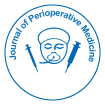
Journal of Perioperative Medicine
Open Access
ISSN: 2684-1290

ISSN: 2684-1290
Short Communication - (2023)Volume 6, Issue 5
Surgical success relies on a complex interplay of factors, with one of the most crucial being perioperative medicine. The term "perioperative medicine" encompasses the medical care provided to patients before, during, and after surgery to optimize their overall well-being and enhance the chances of a successful surgical outcome. In this article, we will delve into the essential role that perioperative medicine plays in surgical success and explore how its principles and practices benefit patients and healthcare providers alike.
The preoperative phase
The journey towards surgical success begins long before the patient enters the operating room. The preoperative phase is a critical period where thorough medical assessments are conducted to identify and manage any existing health issues. This phase involves a comprehensive evaluation of the patient's medical history, physical condition, and laboratory tests. It is essential to ensure that any underlying medical conditions, such as diabetes, hypertension, or heart disease, are well-controlled before surgery. By addressing these issues proactively, perioperative medicine helps reduce the risk of complications during and after the procedure [1,2].
Risk assessment and optimization
Perioperative medicine also plays a pivotal role in risk assessment and optimization. Surgeons and anesthesiologists work closely with perioperative medicine specialists to identify patients at higher risk for complications. These may include elderly individuals, those with multiple comorbidities, or individuals scheduled for complex surgeries. Through careful evaluation, optimization strategies can be developed, which may include medication adjustments, lifestyle modifications, or targeted interventions to improve a patient's overall health and readiness for surgery [3-5].
Enhanced Recovery After Surgery (ERAS)
One of the cornerstones of perioperative medicine is the implementation of ERAS protocols. ERAS focuses on evidencebased practices that aim to reduce surgical stress, minimize complications, and expedite recovery. These protocols encompass various aspects of patient care, such as preoperative nutrition, pain management, and early mobilization. By adhering to ERAS principles, surgical teams can significantly enhance the overall surgical experience for patients, leading to shorter hospital stays, reduced postoperative pain, and faster return to normal activities [6].
Anesthesia management
Effective anesthesia management is a critical component of perioperative medicine. Anesthesiologists carefully select the most appropriate anesthesia techniques and medications for each patient, taking into account their individual needs and medical history. This personalized approach not only ensures patient safety during surgery but also contributes to a smoother recovery process [7].
Postoperative care
Perioperative medicine extends into the postoperative period, where ongoing monitoring and care are essential for a successful outcome. Patients are closely observed for any signs of complications, and pain management strategies are adjusted as needed. Early detection and prompt intervention are key elements of perioperative care, as they can prevent minor issues from escalating into more significant problems [8,9].
Patient education and engagement
An often overlooked but crucial aspect of perioperative medicine is patient education and engagement. Informed patients are better equipped to actively participate in their own care, follow postoperative instructions, and make informed decisions about their recovery. Clear communication between healthcare providers and patients fosters trust and ensures that patients are well-prepared for the surgical experience [10].
The role of perioperative medicine in surgical success cannot be overstated. From the preoperative phase to postoperative care, it provides a comprehensive framework for optimizing patient outcomes. By addressing preexisting medical conditions, reducing surgical stress, and promoting a patient-centered approach, perioperative medicine contributes significantly to the success of surgical procedures. It is a multidisciplinary field that exemplifies the collaboration and dedication of healthcare providers to ensure the best possible results for patients undergoing surgery. As the medical community continues to refine and expand its practices in perioperative medicine, we can expect even greater improvements in surgical success rates and patient well-being.
Citation: Thomas Vetter (2023) Enhancing Surgical Success: The Vital Role of Perioperative Medicine. J Perioper Med. 6:183.
Received: 04-Sep-2023, Manuscript No. JPME-23-26740; Editor assigned: 06-Sep-2023, Pre QC No. JPME-23-26740 (PQ); Reviewed: 20-Sep-2023, QC No. JPME-23-26740; Revised: 27-Sep-2023, Manuscript No. JPME-23-26740 (R); Published: 04-Oct-2023 , DOI: 10.35248/2684-1290.23.6.183
Copyright: © 2023 Vetter T. This is an open-access article distributed under the terms of the Creative Commons Attribution License, which permits unrestricted use, distribution, and reproduction in any medium, provided the original author and source are credited.